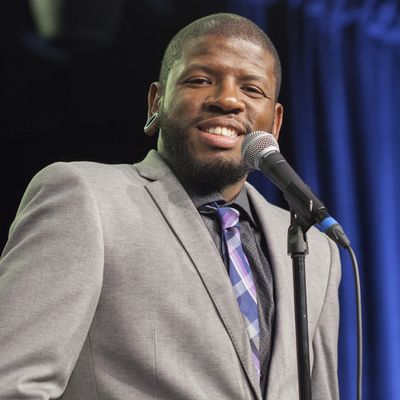
On his HBO special, Burning the Light, which premiered last night, Quincy Jones comes onstage, gives the audience a few high fives and thank yous, and offers an aside about being winded from running onstage. Then the 32-year-old L.A. comedian starts his set. “The reason why we’re doing this is because I had a dream of making a stand-up special and so we set a meager goal of 5,000 [dollars],” he says, earnestly referring his Kickstarter campaign entitled “Comedian Dying of Cancer Hopes to Make a Stand-Up Special.” He continues, “Because of your guys’ love and support and the comedy community, we blew past that and we went to $50,000.”
[Applause, applause, applause.]
“But now I feel pressure, you know what I’m saying? Now I feel pressure and expectations are high … And I feel pressure to die.”
The audience laughs so much, Jones can’t continue the bit — which hilariously heightens that premise. Instead, he’s forced to smile and make faces. It’s a great opener.
Openers are complicated business. The comedian has to just start, essentially taking a car right from parked to 60. Especially for newer comedians like Jones, the audience knows nothing about you except what you look like walking to the mic. (Which is why many comedians open with a joke about their appearance. “I know what you’re thinking — I look like the love child of Harry Potter and Jeff Goldblum,” Nick Kroll used to say.) Not only do opening jokes need to be funny, but they also essentially give context for the entire set to follow. That’s why Jones’s was particularly great.
“I chose that one because I wanted to hurry up and address the elephant in the room,” Jones told me earlier this week. “That way people just knew outright the tone of what the special was going to be about. Because, again, I didn’t want it to be a cancer special.” Considering the situation, especially with Ellen DeGeneres pulling strings to get it on HBO, the whole special could’ve ended up having a Make-a-Wish feel, but with that one joke Jones regained control of the evening and put his style of comedy at the forefront. The audience clearly appreciated it.
“There was a collective sigh of relief,” says Jones. “Like, ‘Okay, this guy is going to go hard for another 50, 55 minutes.” And it’s true: It’s a damn hard joke. It’s one thing to acknowledge that the audience knows you’re dying; it’s another to acknowledge they expect you to die — like any second. That is some uncomfortably real honesty. It was so real that Jones almost went another way with it.
“I had thought about some other ways to try to finesse my way in,” says Jones. “Then my friend was like, ‘Hey, this is a special. Go hard. Say the real.’” Written a week before the special was taped, during a time when Jones was subjected to an incredible amount of media attention for an up-and-comer, that joke is as real as it gets.
There’s a beauty to that. By being completely true to that moment, Jones achieves something really special for any stand-up performance: presentness. Great jokes clear away everything else in the world, demanding you not to worry about your shitty week or whatever’s coming next — even as you talk about it.


